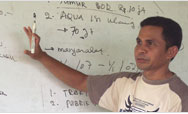You are here » Home » Telling Our Story
Success Story
Providing humanitarian relief and safe water for displaced Iraqis
Improving Living Conditions

| |
Photo: USAID
|
|
A boy in Al Anbar, in western Iraq, fetches water from his family’s water storage tank. The 500-liter tank has put an end to his family’s daily trips to far-away sources of water.
USAID and its partners are improving the quality of life for many displaced Iraqis in Al Anbar province in western Iraq.
|
For many displaced people living in Iraq’s western Al Anbar province, province, water was a scarce commodity. Many depended on sources like public collection points or tanks, which often meant access was unreliable or the water was unsafe to drink. It was not uncommon for women and children to walk up to three kilometers each morning to collect water, only to find that there was none available. The lack of water storage facilities, latrines, and health services caused regular and severe outbreaks of diarrhea and other communicable diseases, which hit children and the elderly especially hard. With no choice but to stay where they were, and with summer fast approaching, water storage tanks were a priority for many families.
In February 2006, USAID through its partner coordinated with local officials to provide 1,000 water storage tanks, jerry cans, and six-month supplies of water purification tablets to the most needy families. Priority households were those headed by women, who were already overburdened with feeding and caring for their families, or by people who were disabled. Fetching water, which was especially difficult for those households, would no longer be a burden. In addition, local officials coordinated with USAID to make sure that potable water sources could be accessed by other vulnerable families. Several compact water treatment units were rehabilitated, improving the quality and supply of many neighborhood water sources.
Through its partner, USAID also helped displaced people in the area in other ways. USAID improved sanitation conditions by rehabilitating several compact water treatment units and provided vulnerable families with much-needed income through a community clean-up campaign. USAID provided vital medical and health supplies, and also distributed supply kits, including cooking stoves, utensils, heaters, blankets, and food to 500 of the most vulnerable families in the area.
For many of the displaced people in Al Anbar, returning home is not an option. But with assistance from USAID, people have gained access to safe drinking water and sanitary facilities, improving daily living conditions for those who need it the most.
Print-friendly version of this page (440kb - PDF)
Click here for high-res photo
Back to Top ^ | 

